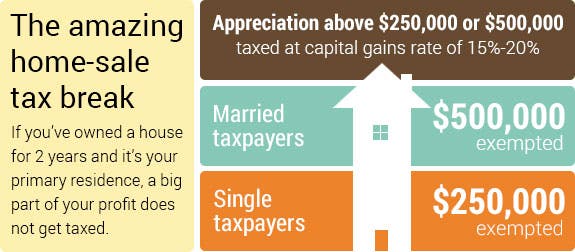Table of Content
However, there are exceptions to the eligibility requirements, which are outlined on the IRS website. For taxpayers with more than one home, a key point is determining which is the principal residence. The IRS allows the exclusion only on one’s principal residence, but there is some leeway for which home qualifies. Simply put, this means that during the previous five years, if you lived in a home for a total of two years, or 730 days, that can qualify as your primary residence.
However, there are also ways to avoid paying the tax on these property types, especially if they’ve increased in value in recent years. Another alternative available to longtime real estate investors with large capital gains tax liabilities is to transfer those assets into an opportunity zone. Investors begin to enjoy a step up in basis after 5 years. For long-term capital gains rates, though, lower rates are available. That's because lawmakers wanted investors to have an incentive to invest for the long run. A year plus a day isn't really a long time for many investors, but it's the rule that lawmakers arbitrarily selected.
Adjust your profits to reflect any acquisition costs or property improvements
Your new cost basis will increase by the amount that you spent to improve your home. Improvements that are necessary to maintain the home with no added value, have a useful life of less than one year, or are no longer part of your home will not increase your cost basis. The main major restriction is that you can only benefit from this exemption once every two years.

Your two years of residency and the two years of ownership don't have to be concurrent. You can live in the home for a year, rent it out for three years, then move back in for 12 months. The IRS figures that if you spent this much time under that roof, the home qualifies as your principal residence. You've made a profit if the resulting number is positive.
What Is The Real Estate Gift Tax And How Can I Avoid It?
If your goal in buying an asset is to sell it to another investor at a future date for a higher price, then you'll generally be subject to capital gains tax when you sell. The two years don’t need to be consecutive, but house-flippers should beware. If you sell a house that you didn’t live in for at least two years, the gains can be taxable. Selling in less than a year is especially expensive because you could be subject to the short-term capital gains tax, which is higher than long-term capital gains tax.

Making sure that you hold onto winning investments long enough to get the lower long-term capital gains tax rate is also a popular strategy. That doesn't mean it always works, as sometimes quick gains you earn soon after buying a stock can disappear by the time you've held it for longer than a year. Nevertheless, if you're close to the one-year mark, then hanging on a little while longer can mean the difference between a big tax bill and a much smaller one. Use the Internal Revenue Service primary residence exclusion, if you qualify. For single taxpayers, you may exclude up to $250,000 of the capital gains, and for married taxpayers filing jointly, you may exclude up to $500,000 of the capital gains .
What Are Capital Assets?
It's usually fairly easy to figure out whether you have a capital gain, especially with publicly traded investments like stocks or funds. If the price of your stock or fund has gone up since you bought your shares, you'll generally have a capital gain, and if the price has gone down, you'll have a capital loss. $500,000 of capital gains on real estate if you’re married and filing jointly. It feels great to get a high price for the sale of your home, but in some cases, the IRS may want a piece of the action. That’s because capital gains on real estate can be taxable. Here’s how you can minimize or even avoid a tax bite on the sale of your house.
Small Business Small business tax prep File yourself or with a small business certified tax professional. Even if you don’t meet the eligibility test for full exclusion of gain, you may qualify for partial exclusion. ❌ Don’t report the home sale if all of your gain is tax exempt. Remember the rule that you need to have lived in the home for at least two years in the five-period prior to the sale? Under certain circumstances, service members can suspend that five-year period for up to 10 years to allow for the time you were away on duty.
capital gains tax rates
Document your condition and the situation with a statement from your physician if you're forced to sell your house for medical or health reasons. This, too, allows you to live in the home for less than two years yet still qualify for the exclusion. You don't have to file the letter with your tax return, but keep it with your personal records just in case the IRS wants confirmation. Stocks, bonds, mutual funds, real estate properties, gold, coins, fine arts and other collectibles are considered capital assets in the investment category. Capital gains tax is usually charged as a percentage of the profit earned from selling your assets based on your country’s tax laws and prevailing rates.
Can sell for about 1% below list price and go pending in around 33 days. The average homes sell for about 3% below list price and go pending in around 65 days. School service boundaries are intended to be used as a reference only; they may change and are not guaranteed to be accurate. To verify school enrollment eligibility, contact the school district directly. A financial advisor can help you manage your investment portfolio.
This material is for general information and educational purposes only. Information is based on data gathered from what we believe are reliable sources. It is not guaranteed as to accuracy, does not purport to be complete and is not intended to be used as a primary basis for investment decisions. It should also not be construed as advice meeting the particular investment needs of any investor. Federal pricing will vary based upon individual taxpayer circumstances and is finalized at the time of filing.

Sort out the investments you've sold into those that have a profit or a loss. The money you make on the sale of your home might be taxable. You want to report the gain as taxable, even if all or a portion falls within the exclusionary guidelines. Also, if the grantee has ownership in the house, the use requirement can include the time that the former spouse spends living in the home until the date of sale.
Another caveat is that the capital gains tax exclusion doesn’t apply to any depreciation-related capital gains. Capital gains attributable to depreciation during the time you rented out the property can be taxed at a rate of 25%. The strategies for curbing your capital gains liability depend on the nature of the house you’re selling. If you’re selling a primary residence , you may be eligible for Section 121 exclusion. There are time limits you need to follow to avoid the swap being taxable. First, you have to identify replacement properties in writing to your intermediary within 45 days of selling your relinquished property.
The 1031 exchange allows for the tax on the gain from the sale of a property to be deferred, rather than eliminated. If the FMV of the property at the time the donor made the gift is less than the donor's adjusted basis, your adjusted basis depends on whether you have a gain or loss when you dispose of the property. Treat worthless securities as though they were capital assets sold or exchanged on the last day of the tax year. Tax-loss harvesting, which involves selling losing investments to offset the gains from winners. If you inherit a home, you don't get the $250,000 exemption unless you've owned the house for at least two years as your primary residence. But you can still get a break if you don't meet that criteria.

No comments:
Post a Comment